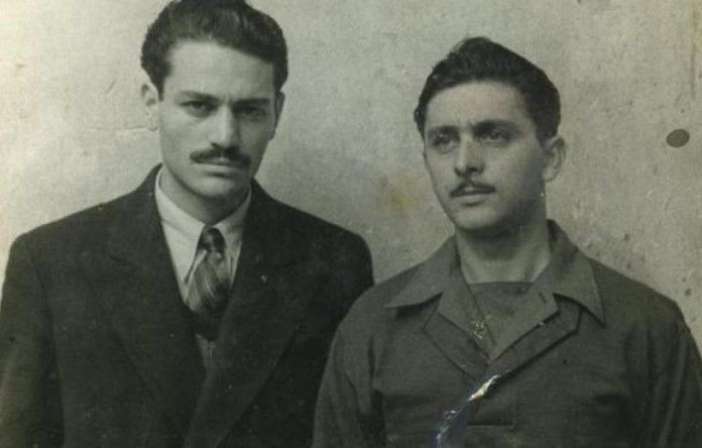It was May 30, 1941 when two teenage Greek boys, Manolis Glezos and Lakis Santas, climbed up the Acropolis and took down the Nazi flag. It was the very first of many brave acts of resistance against the occupying army in World War Two in Greece.
One of the most humiliating moments—not only for Greece but for all humanity—was when on April 28, 1941, the Nazi flag, the swastika, was hoisted atop Acropolis Hill on the very cradle of democracy and Western Civilization.
It was the day when German troops entered Athens to take control of the surrendered city. The moment the Nazi flag flew in the sky of Attica marked the beginning of three and a half years of pain, hunger, and death under the Wermarcht boot.
Yet two young men, barely 18, made a heroic move that later proved to be the beginning of the great Greek resistance to the Nazis. The two youths, Manolis Glezos and Lakis Santas, climbed Acropolis Hill at night and took down the swastika flag, dealing a symbolic blow to the powerful occupying forces.
Taking down Nazi flag was an act of defiance
It was a gallant act, an act of proud defiance which ultimately raised the spirit of Greece and made them believe that, indeed, they could resist the Nazis. It was a demonstration of the power of the human spirit against the power of guns.
Grecian Delight supports Greece
The young men’s plan to pull down the Nazi flag from the Acropolis had been organized days earlier. They read everything they found about the Acropolis in encyclopedias. Most importantly, they read about natural tunnels and crevices in the Sacred Rock and other points where they could hide.
On the morning of May 30, 1941, Glezos and Santas heard on the radio that Crete had fallen. The two young men decided it was time to act.
At 9:30 pm, the Acropolis’ small guard was gathered in Propylaia, drinking beer and getting drunk. The two men jumped over the wire fences and crawled through the cave at the Pandroseion sanctuary.
They climbed up the archeologists’ scaffolding and came to within a few meters of the flagpole, without being spotted by any guard. Moving quickly, they took down the hated Nazi flag.
The two students, armed with only a small knife, a lantern, and a ton of courage, had done what seemed impossible: They climbed 34 meters (111.5 feet) up Acropolis Hill in the middle of the night under a strict curfew, approached the flag, and cut it down. They then went 34 meters downhill, crossing the empty streets of central Athens, and quietly returned to their homes.
Later in their lives, Glezos and Santas spoke about the carefully orchestrated act, their practice the day before, and the fear they felt when returning to their homes. They were admittedly lucky by any measure, but luck is always on the side of the brave.
Sentenced to death in absentia for taking down flag
Early the next morning, the German guards realized that the flag was missing. The Nazi authorities ordered several interrogations and by 11 AM, a new Nazi flag was flying above the Acropolis.
On June 1st, the Greek newspaper Eleftheron Vima published a proclamation from the German commander stating that the “unidentified culprits” responsible for taking down the Nazi flag from the Acropolis had been sentenced to death in absentia—a punishment that was never applied.
Glezos ended up being arrested three times by the Nazis during the German occupation of Greece for a variety of other acts of defiance. He was even temporarily imprisoned, but managed to escape, while Lakis Santas escaped the enemy entirely and joined the leftist Greek People’s Liberation Army (ELAS), which resisted the Nazis.
Apostolos Santas died in Athens at age 89 in 2011, and Manolis Glezos passed away at the age of 98 on March 30, 2020.
Philip Chrysopoulos, Greek Reporter
Photo: Greek freedom fighters Manolis Glezos (L) and Apostolis Santas resisted the Nazis in Greece. Credit: Public Domain
ΟΔΥΣΣΕΙΑ, 30/5/2024 #ODUSSEIA #ODYSSEIA

